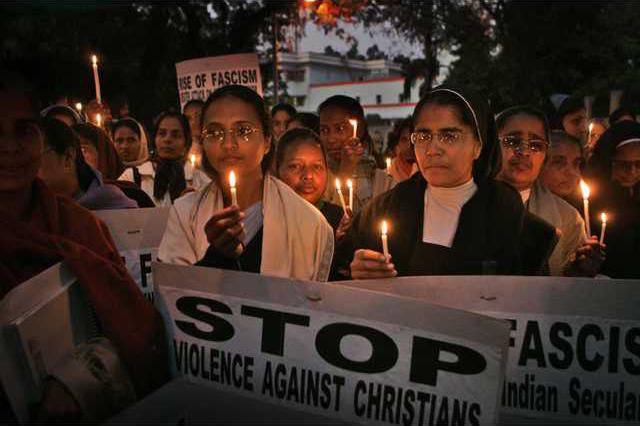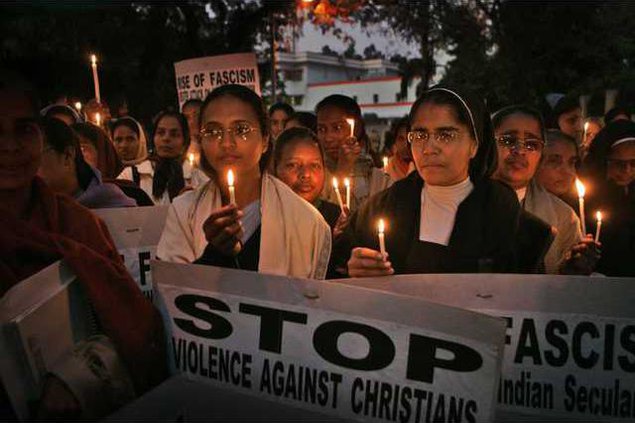NEW DELHI — Hindu extremists torched nearly a dozen churches and the home of a Christian leader Thursday, defying a curfew imposed to quell three days of religious violence in eastern India. Christians retaliated by setting fire to several homes belonging to Hindus.
Local police have been unsuccessful in halting the attacks and the federal government announced it was sending in a paramilitary force.
About 19 churches, most of them small mud and thatch buildings, have been razed since violence broke out on Christmas Eve when long-standing tensions between the Hindu majority and the small Christian community erupted over conversions to Christianity.
Hindu groups have long charged Christian missionaries with trying to lure the poor and those who occupy the lowest rungs of Hinduism’s complex caste-system away with promises of money and jobs.
On Thursday, a mob of Hindus burned down the house of Radhakant Nayak, a member of India’s upper house of parliament and a Christian leader in the area, Nayak told the CNN-IBN news channel.
Also, 11 churches were ransacked and burned in Kandhamal district of Orissa state, the Press Trust of India quoted unnamed police officials as saying.
Superintendent of Police Narsingh Bhol said several prayer houses were ransacked and some were set on fire, but he did not have the exact number.
Meanwhile, in the village of Brahmangaon, a group of Christians burned down several Hindu homes in an apparent retaliation for the attack on churches. Angry Hindus then burned down the village police station, complaining of a lack of protection, a local police official said, speaking on condition of anonymity because he was not authorized to speak to reporters.
Bahugrahi Mahapatra, a senior government official in the area confirmed there had been ‘‘disturbances’’ in the village, but could not provide details.
One person has been killed and at least 25 people, belonging to both Hindu and Christian communities, have been arrested for suspected involvement in the violence, Bhol told The Associated Press by phone.
But the arrests and curfew have not stopped the attacks and the federal government said it was sending in a 300-strong paramilitary force.
‘‘We have to get the violence under control,’’ the junior federal home minister, Sriprakash Jaiswal, told reporters.
India is overwhelmingly Hindu but officially secular. Religious minorities, such as Christians, who account for 2.5 percent of the country’s 1.1. billion people, and Muslims, who make up 14 percent, often coexist peacefully.
But throughout India’s history, the issue of conversions has provoked violence by hard-line Hindus.
Orissa has one of the worst histories of anti-Christian violence. An Australian missionary and his two sons, aged 8 and 10, were burned to death in their car in Orissa following a Bible study class in 1999.
Orissa is the only Indian state that has a law requiring people to obtain police permission before they change their religion. The law was intended to counter missionary work.
There were conflicting reports of what started the violence in the rural district of Kandhamal, about 840 miles southeast of New Delhi. Each side blamed the other.
The Hindu hard-liners said Christians had attempted to attack one of their leaders, who heads an anti-conversion movement.
But the New Delhi-based Catholic Bishops Conference of India said the fighting began when Hindu extremists objected to a show marking Christmas Eve, believing it was designed to encourage conversions.
Local police have been unsuccessful in halting the attacks and the federal government announced it was sending in a paramilitary force.
About 19 churches, most of them small mud and thatch buildings, have been razed since violence broke out on Christmas Eve when long-standing tensions between the Hindu majority and the small Christian community erupted over conversions to Christianity.
Hindu groups have long charged Christian missionaries with trying to lure the poor and those who occupy the lowest rungs of Hinduism’s complex caste-system away with promises of money and jobs.
On Thursday, a mob of Hindus burned down the house of Radhakant Nayak, a member of India’s upper house of parliament and a Christian leader in the area, Nayak told the CNN-IBN news channel.
Also, 11 churches were ransacked and burned in Kandhamal district of Orissa state, the Press Trust of India quoted unnamed police officials as saying.
Superintendent of Police Narsingh Bhol said several prayer houses were ransacked and some were set on fire, but he did not have the exact number.
Meanwhile, in the village of Brahmangaon, a group of Christians burned down several Hindu homes in an apparent retaliation for the attack on churches. Angry Hindus then burned down the village police station, complaining of a lack of protection, a local police official said, speaking on condition of anonymity because he was not authorized to speak to reporters.
Bahugrahi Mahapatra, a senior government official in the area confirmed there had been ‘‘disturbances’’ in the village, but could not provide details.
One person has been killed and at least 25 people, belonging to both Hindu and Christian communities, have been arrested for suspected involvement in the violence, Bhol told The Associated Press by phone.
But the arrests and curfew have not stopped the attacks and the federal government said it was sending in a 300-strong paramilitary force.
‘‘We have to get the violence under control,’’ the junior federal home minister, Sriprakash Jaiswal, told reporters.
India is overwhelmingly Hindu but officially secular. Religious minorities, such as Christians, who account for 2.5 percent of the country’s 1.1. billion people, and Muslims, who make up 14 percent, often coexist peacefully.
But throughout India’s history, the issue of conversions has provoked violence by hard-line Hindus.
Orissa has one of the worst histories of anti-Christian violence. An Australian missionary and his two sons, aged 8 and 10, were burned to death in their car in Orissa following a Bible study class in 1999.
Orissa is the only Indian state that has a law requiring people to obtain police permission before they change their religion. The law was intended to counter missionary work.
There were conflicting reports of what started the violence in the rural district of Kandhamal, about 840 miles southeast of New Delhi. Each side blamed the other.
The Hindu hard-liners said Christians had attempted to attack one of their leaders, who heads an anti-conversion movement.
But the New Delhi-based Catholic Bishops Conference of India said the fighting began when Hindu extremists objected to a show marking Christmas Eve, believing it was designed to encourage conversions.

